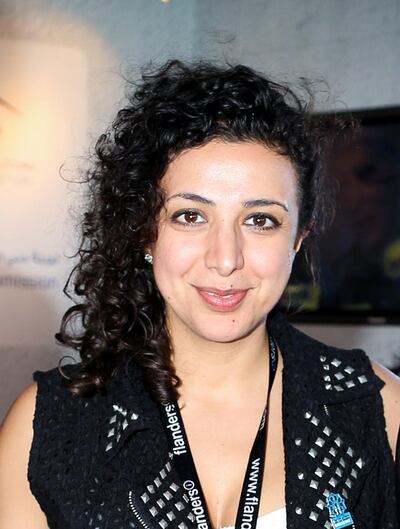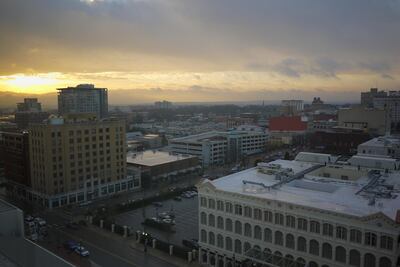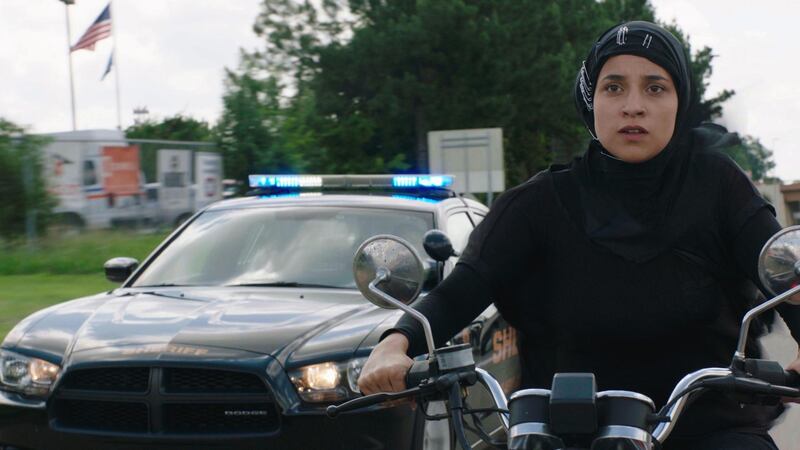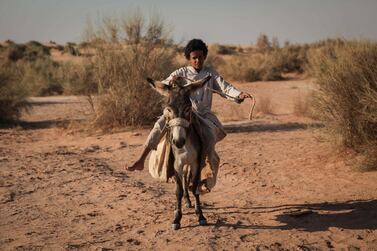At this month's Miami International Film Festival, following the world premiere of her second film, Marjoun and the Flying Headscarf, director Susan Youssef watched the audience cry during the end credit sequence and thought to herself: "It makes 17 years of work worth it."
"I first wrote Marjoun and the Flying Headscarf as a short film in 2002, when I was closer to the age of Marjoun's character," Youssef tells The National of the film, which follows a teenage girl's mission to free her father jailed on dubious terrorist charges. "Somehow over the years, I have been exploring my place and through the three generations of women in this film, I look at where we were and where we are going."
Growing up in America
Youssef first created Marjoun as a character after the 9/11 attacks. It was a moment when the internal conflict that had engulfed her throughout her life, of being both Arab and American, was brought into graphic focus. "The film contemplated the idea of assimilation: is it possible? Was it ever possible? And it looked at the power of asserting identity as well," Youssef says.
A look at the life of the director shows why identity crisis is a big theme for her. Born in Bay Ridge, Brooklyn, to a Lebanese father and Syrian mother, Youssef's initial knowledge of the Middle East was scarce. The family grew up in Staten Island, New York, without enough money to travel, so her exposure to Arab cultural heritage came through visits to the community centre and spending time in the company of her parents' friends and their children. "On the other side, I went to a strict Catholic school and that was extremely isolating and strange as obviously I didn't take communion," she recalls. "In a 90-girl class, I didn't have a single Arabic classmate."
Youssef made her first trip to Lebanon in 1999, when she was in her early twenties, to work as a teacher. "It was my last year at college," she says. "I had been working as a paralegal every summer up until that point and I was having an existential crisis as I saw all these bourgeois kids getting these jobs in other countries and I thought I'd try the same. I knew somebody and they got me a teaching job in Beirut."
In Lebanon, Youssef's vibrant personality and ambition shone. She started The Daily Star newspaper. "That's how I ended up meeting all these filmmakers and learning more about Palestinian refugee camps in the south of the country," she says.

Youssef attended the University of Virginia as an undergraduate, and made a film about her grandparents and sent it to film schools. "My father was furious that I submitted it to film schools, saying, 'That is a video of my parents and you didn't ask permission, you just submitted it to these people.' I was accepted into the University of Texas at Austin Film School and chose it because it was cheap and it was really good film school," she says.
A chance to analyse her own cultural identity
Her parents didn't want her to go and wanted to get her married, but Youssef followed her heart and began writing and directing. To make ends meet, she took a job working as a waitress at a dive bar, where she was during the attack on the World Trade Centre buildings. The following summer, Youssef went to Palestine. "It wasn't an intellectual decision, it was just an attraction, just as some people like [the band] The Smiths, I just had to go," she says.
Being abroad and making films enabled her to analyse her own cultural identity. "Every time I make a film, I learn more about being an Arab in America," Youssef says. "My student documentary, which I shot in Palestine, Forbidden to Wander, was the first time I seriously began to explore my identity in terms of my civil rights."
She initially wrote Marjoun, which is set in Arkansas, as a short film. "It's set in 2003, and is about the transforming, long-term effect of 9/11 on Muslim and Arab American families, and therefore their place in society as a whole," she says.
In the end, the short was made as part of her film programme in Austin and had its premiere at the Sundance Film Festival in 2006, where it was well received. This was followed in 2011 by her debut feature film Habibi Rasak Kharban (Darling, Something's Wrong With Your Head), which had its world premiere at the Venice Film Festival that year. It won awards around the world, including Best Film at the Dubai International Film Festival three months later.
The story of Marjoun stayed with Youssef and she decided to make it feature-length, while the storyline and characters began to evolve. "The casting process was long and diverse, starting back in 2014," she says. "The little girl playing Jinane, I found through an open call at the Arab American National Museum in Dearborn, Michigan. I had not written this character as a hijabi, so when I auditioned her, I had not anticipated a child hijabi coming to audition."
Youssef also cast The Syrian Bride and Inheritance star Clara Khoury as the mother in the film. "We met in 2002 in Palestine when we were both young women. I had always wanted to work with her. She had moved to the US, so I was so fortunate," she says.
A modern-day James Dean
The director also drew from the experiences she picked up from making Habibi, which helped her refine the filmmaking process and create a better feature. "I believe that creatively it was easier for me to make this film, because I knew so much more about how to work with my editor, actors and crew. Since Habibi, I had made three shorts and had much time to meet more experienced directors and improve my process.

"I think every filmmaker has repeating running themes in their work. Perhaps my biggest obsession is the search for divine love: a Sufi narrative. This film explores the relations between two daughters who love their father so much; such a pure love unfettered by his decisions. The girls love their father unconditionally and seek to experience him again."
Another key theme of her work is the feeling of alienation. "Habibi was about imprisonment and this film, also set in a prison, is more about the feeling of being alone but surrounded," she says.
To help create that feeling, Youssef kept the 1930 Edward Hopper painting Early Sunday Morning, which shows small businesses closed during the Great Depression, as a frame of reference. "Over and over again, I told my director of photography, please look at this painting. It should evoke for you every second of alienation that seeped into our film," she says.
This process worked and its influences combined with Youssef's unique and complex film, in which the image of a girl in a hijab riding a motorbike transforms Marjoun into a modern-day James Dean.







